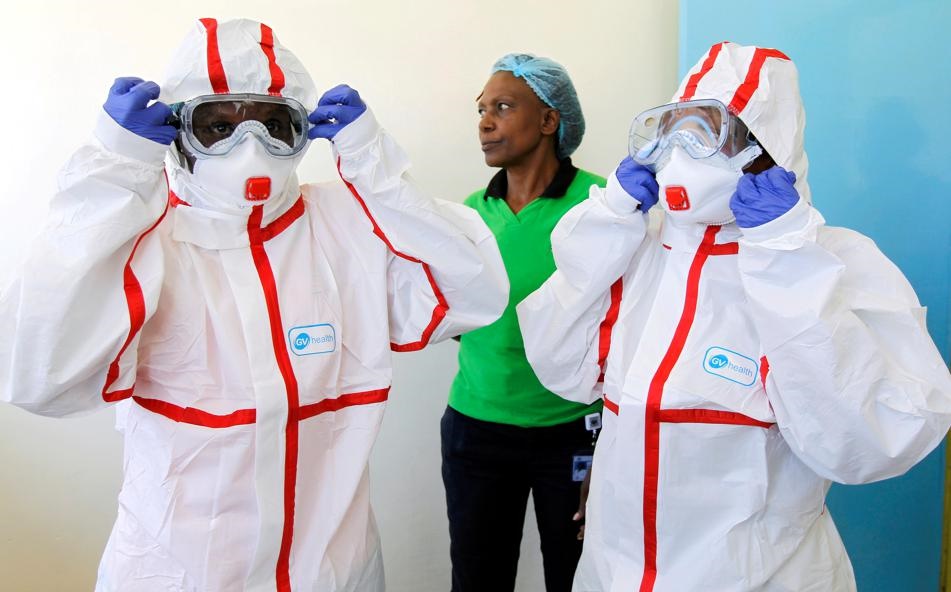
In the wake of growing panic after three confirmed cases of the coronavirus (Covid-19) in South Africa, some residents in the quaint, affluent town of Hilton, KwaZulu-Natal, have told City Press they are “scared” and “terrified for my children”.
First responders from around the province have also questioned the state of readiness of their own training and facilities.
But others in the medical profession, including health minister Dr Zweli Mkhize, have said the frenzy over potential infection was unwarranted, and had been spurred on by a sometimes irresponsible media, fake news, and social media.
The 38-year-old KwaZulu-Natal man, who was the first person in the country to have the coronavirus, works in Hilton and visited Hilton-based general practitioner Dr Robyn Reed this week after experiencing flu-like symptoms upon returning from an Italian holiday with his wife.
Italy is a known hotspot for the virus, with the latest recorded cases standing at 4600 and the death toll sitting at 197.
The KwaZulu-Natal man is currently being isolated at Pietermaritzburg’s Grey’s Hospital.
The National Institute for Communicable Diseases (NICD) teams landed in the province on Thursday night to start contact tracing.
Dr Reed and others at the practice have been self-quarantining, as have the patient’s wife and two small children, who Mkhize announced on Friday were asymptomatic.
However, the wife was on Sunday morning confirmed to have the virus.
The children’s school was closed as a precautionary measure, and it is not yet clear when it will reopen.
City Press this week contacted the four designated referral hospitals in KwaZulu-Natal expected to handle any positive Covid-19 cases.
Only one hospital appeared to be ready, impressive even, but another’s phone went unanswered.
At another, a concerned caller was told to avoid public gatherings and to “boost your immune system, take Vitamin C, eat fruit”.
And while the shelves in many Durban retailers that have been emptied of hand sanitiser and hygiene wipes may just be an indication of caution, it is clear that some in the medical profession are themselves ill-informed and panicking.
Two nurses – both having worked at Durban’s Addington Hospital for over 10 years each – and another staff member, told City Press they were “scared” of contracting the virus, as they believed they had not received sufficient training.
Addington is one of the province’s designated coronavirus treatment hospitals, along with Greys, Manguzi in the far north – close to the eSwatini and Mozambique borders, and Ngwelezane, on the outskirts of Empangeni.
“A mother and her son came in for testing [on Friday]. They were put in the isolation ward and bloods and swabs were done. Only the senior nurses can handle [suspected Covid-19 patients],” said one nurse.
“Both of those people went home afterwards to go into [self-isolation]. The mother looked okay, but the son looked sick. The people from NICD were at the hospital [on Friday morning] to have a meeting.
“There is no cure for this thing, so we are scared,” added the nurse, saying that gloves and masks would offer little protection.
Said the other nurse: “I am scared of this virus. We do not have enough protective clothing. We are not trained to deal with coronavirus, it is all new.
“The matron told us we must be ready if we have to work with the patients. We are not expected to refuse, but if I am allocated, I am going to refuse. I need training and protective clothing, I have a family, I have to think about myself and my family.”
According to the other staff member: “We were told we are expecting another potential case, the person was referred from Tongaat clinic. We are not ready for this.”
But Mkhize has said the province’s hospitals are ready.
The KZN facilities may be ready when the health minister visits them, but for ordinary citizens, getting hold of the hospitals for basic coronavirus information can prove frustrating.
City Press asked two people to phone the switchboard operators at each hospital to ask about the protocols for those suspecting they may be infected.
The receptionists were engaged in isiZulu and then English to remove any possible language barriers.
The phone at Addington rang until it simply stopped on three different occasions.
Finally, after a wait of over a minute, the switchboard was answered by a man who, to his credit, referred the caller to “the matron in charge” as soon as he heard the word coronavirus.
The matron, who our caller described as “pleasant and professional” told the caller that if a person suspected he or she was infected, they had to go to “nearby healthcare centres, like a clinic, doctor, hospital and get tested there. Addington will only take the patient if [tests] are positive for corona”.
“If you come to outpatients at Addington [suspecting you have been infected], then they have to screen you and they assess whether they admit you or if you go back home”.
The matron said the facility had all of the equipment necessary “for isolation”, and that staff had all of the necessary gear and training.
She also advised the caller – who admitted to being healthy but fearful of contracting the disease, to “just stay away from malls, parties, stay away from those things. Wash your hands, boost your immune system, take vitamin C, fruit.
“It is not as bad as it appears in the media. It’s just a flu, your body can fight it.”
She said the hospital had, at this stage, not dealt with any positive cases of the virus.
The switchboard operator at Grey’s Hospital also told our callers to “go to your local clinic to get the testing, and then you will wait for the results at home. Once they contact you, and if it’s positive, they will refer you to Grey’s Hospital.”
Asked if it was wise for an infected person who suspected they were infected to wait in a crowded clinic for tests, the switchboard operator said:
“Well, if you were in contact with someone who came from international places ... it would just be, the chaos issue, maybe a person just has the normal flu.
“But if you know you have been in contact with someone who came from another country, then yes, you can go get the testing.”
Oddly, it was the correspondence one of our callers had with the Manguzi Hospital, situated close to the Mozambique and Swaziland borders, that left her feeling the rural facility was most prepared to handle any Covid-19 cases.
While the switchboard operator was courteous and helpful, it was another staff member who gave more insight into how the hospital was structured to deal with highly infectious diseases.
The person said the hospital was “as prepared as we can be”.
In fact, said the employee, “we may have overdone it on the safety gear; it is stacked to the roof”.
The staff member said the level of preparedness at Manguzi was because it was also a designated treatment centre for the ebola virus.
The staff member said the country’s approach to coronavirus had been “very much blown out of proportion by the panic”.
“We have an isolation ward, a lot of personal protective gear, we have had all of our staff trained, from the general orderlies, to security, to HR; everybody has been made aware.
“All of the people working there are doing drills; we have had meetings with port health because we are near the border, [we have met with] emergency medical rescue services, I think we are as ready as we can be.”
The employee said the hospital was training its own staff, which was similar to that for ebola.
The facility had a “brilliant” infection control nurse who had “taken the bull by the horns” to facilitate training.
The hospital’s security guards manning the gates had been “sensitised” to those who fit the description of a possibly infected patient, and they would be fast-tracked past the queues to a designated room in the outpatient department.
The NICD’s professor Cheryl Cohen and professor Lucille Blumberg were “really on top” of the Covid-19 threat in South Africa, said the employee.
“I am quite impressed with what they have been doing”.
Cohen told City Press on Saturday that a “large number” of people including “contacts from the [positive KZN case] had been tested on Friday night, and that the information would be released later in the day.
Cohen said she believed the country was ready to contain any potentially serious outbreak of Covid-19.
The National Assembly’s portfolio committee chairperson on health, Dr Sibongiseni Dhlomo, said late on Friday that he was reassured that the national health department and port health services could “carry out active surveillance, early detection, isolation and case management, contact tracing and prevention of onward spread of Covid-19 infections”.
Dhlomo said the committee was considering conducting site visits of various ports of entry to assess the rollout and readiness of precautionary screening and testing.
 | ||||||||||||||||||||||||||
Get in touchCity Press | ||||||||||||||||||||||||||
| ||||||||||||||||||||||||||
| Rise above the clutter | Choose your news | City Press in your inbox | ||||||||||||||||||||||||||
| City Press is an agenda-setting South African news brand that publishes across platforms. Its flagship print edition is distributed on a Sunday. |




 Publications
Publications
 Partners
Partners








